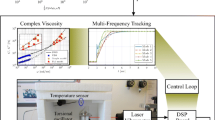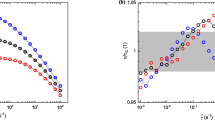Abstract
The modeling of three different types of resonating viscosity sensors is presented. The results from these analytical, closed-form models relating measurement data to the viscosity are compared to measurement results from sample liquids.
Access this chapter
Tax calculation will be finalised at checkout
Purchases are for personal use only
Preview
Unable to display preview. Download preview PDF.
Similar content being viewed by others
References
Heinisch, M., Reichel, E.K., Jakoby, B.: A Study on Tunable Resonators for Rheological Measurements. In: Proc. SPIE, vol. 8066, p. 806629 (2011), doi:10.1117/12.887103
Heinisch, M., Reichel, E.K., Jakoby, B.: Miniaturized Resonating Viscometers Facilitating Measurements at Tunable Frequencies in the Low kHz-Range. In: Proc. Eurosensors (in print, 2011)
Heinisch, M., Reichel, E.K., Jakoby, B.: A Suspended Plate In-Plane Resonator for Rheological Measurements at Tunable Frequencies. In: Proc. Sensor+Test, pp. 61–66 (2011)
Heinisch, M., et al.: A resonating rheometer using two polymer membranes for measuring liquid viscosity and mass density. Sens. Actuators A: Phys. (2011), doi:10.1016/j.sna.2011.02.031
Reichel, E.K.: Dynamic Methods for Viscosity and Mass Density Sensing, PhD Thesis, Institute for Microelectronics and Microsensors, Johannes Kepler University, Linz, Austria (2009)
Voglhuber, T., et al.: Semi numerical simulation o fa miniaturized vibrating membranerheometer. In: Proc. Sensor 2009 Conference, Nuremberg, Germany, May 26-28, vol. 1, pp. 41–46 (2009)
Elwenspoek, M., Wiegerink, R.: Mechanical microsensors. Springer, Heidelberg (2001)
Landau, L.D., Lifshitz, E.M.: Fluid Mechanics, 2nd edn. Butterworth-Heinemann, Butterworths (1987)
Rosenhead, L.: Laminar Boundary Layers. Clarendon, Oxford (1963)
Sader, J.E.: Frequency response of cantilever beams immersed in viscous fluids with applications to the atomic force microscope. Journal of Applied Physics 84, 64–76 (1998)
Riesch, C.: Micromachined Viscosity Sensors, PhD Thesis, Technical University Vienna, Austria (2009)
Martin, S.J., Granstaff, V.E., Frye, G.C.: Characterization of a Quartz Crystal Microbalance with Simultaneous Mass and Liquid Loading. Anal. Chem. 63, 2272–2281 (1991)
Author information
Authors and Affiliations
Editor information
Rights and permissions
Copyright information
© 2012 Springer-Verlag Berlin Heidelberg
About this paper
Cite this paper
Heinisch, M., Reichel, E.K., Jakoby, B. (2012). On the Modelling of Resonating Fluid Sensors. In: Moreno-Díaz, R., Pichler, F., Quesada-Arencibia, A. (eds) Computer Aided Systems Theory – EUROCAST 2011. EUROCAST 2011. Lecture Notes in Computer Science, vol 6928. Springer, Berlin, Heidelberg. https://doi.org/10.1007/978-3-642-27579-1_4
Download citation
DOI: https://doi.org/10.1007/978-3-642-27579-1_4
Publisher Name: Springer, Berlin, Heidelberg
Print ISBN: 978-3-642-27578-4
Online ISBN: 978-3-642-27579-1
eBook Packages: Computer ScienceComputer Science (R0)




